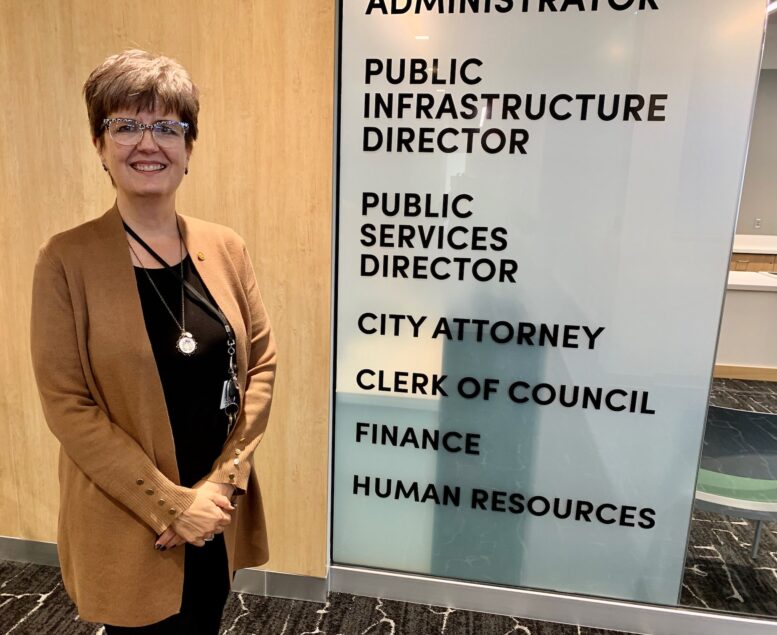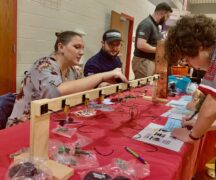By JULIE CARLE
BG Independent News
Barbara Ford didn’t grow up dreaming of being a personnel administrator, but she found her forte during the 40 years she worked for the City of Bowling Green.
Ford, who retires at the end of the month as the city’s human resources director, “has been a true advocate for our employees and worked tirelessly to help them through difficult situations,” BG Municipal Administrator Lori Tretter announced at the recent Bowling Green City Council meeting.
Ford’s road to director
She came from Bryan, Ohio, to Bowling Green to attend Bowling Green State University, where she studied political science and geography with a thought to attend law school. An offer for a graduate assistantship in the BGSU public administration master’s program, was an offer she couldn’t refuse, and which ultimately led to a summer internship. She worked with then personnel director John Fawcett in 1983 when Bruce Bellard was mayor.
After finishing her master’s degree, she was hired in April 1984 for a full-time, temporary position in the utilities business office. Nine months later she was hired to split her time between working for the utilities director and the grants administrator.
In 1989, she ended up back working as a secretary for Fawcett in personnel, and in December 1994 when he became assistant municipal administrator, Ford took the mantle as personnel director.
While overseeing a city personnel department was not a consideration for the 1983 college graduate a college graduate, she found the work was not far from her interest in law.
“Dealing with ADA (Americans with Disabilities Act) and the Department of Labor fed that kind of interest for me,” she said.
Quoting Wes Hoffman, one of the six mayors she worked with during her city career, “I know a lot about a little, but not a lot about any one thing,” she joked. “That’s what HR is. You have a broad variety of interests, and you are not pigeonholed into being an expert.”
Human resources serves as city’s umbrella
Ford liked being that umbrella for the city, dealing with all branches of the operation.
It was that diversity of daily responsibilities that made the job interesting and allowed her to research and figure out answers or solutions.
“There is a lot involved with human resources from compliance to legalities to safety logistics for employees. She has been a tremendous asset to this organization,” Tretter said.
In addition to working with mayors Bellard and Hoffman, she also worked with Ed Miller, John Quinn, Dick Edwards and Mike Aspacher.
Ford has had to learn the ins and outs of negotiating with unions but has enjoyed the lessons.
“Every union contract is a little different. When we negotiate new contracts, I always like to think of negotiating like a dance,” she said.
The key is communication which requires some compromises on both sides. She is not a “right fighter” who believes they are right and fights to the end.
“We all have our positives and negatives, but I’d like to think I am able to see a bigger picture and offer options,” she said.
Both sides may not be 100% satisfied with all points of the negotiations. “If we are all at 70% consensus, we can live with this for now. You don’t have to win; we just agree on something and move on,” she added.
Changes are part of the challenges
Changes in the workforce and technology have provided challenges during her tenure.
Hiring today is very different than when she started. Early in her career, there were levies for police and fire that allowed her to do a lot of hiring. As those employees are retiring, she has had to decide if positions are needed or if there are other ways to fill vacancies.
Applicant pools are considerably smaller, making the hiring process more complicated. The city isn’t the only employer struggling to fill positions, she pointed out.
“People aren’t staying. Every generation is different. Generationally, there is a switched mindset. They aren’t staying for a career,” she said.
The change in applicant pools has meant taking a step back and thinking about what is best for the city. They might not fill the vacancy, or they might wait six weeks and repost the position, hoping for more people to apply.
She has also had to integrate technology into the processes, changing from an all-paper system to a computer-based one. In the move from the Church Street building to the new city building, her department has gone from 18 file cabinets to four. Everything else has been digitized, making finding documents much easier to locate, she said.
One of Ford’s accomplishments was the 2021 success at updating the department’s name from personnel to human resources. It was a long time coming, but a change that better reflects the work that is done, she said.
Working with people is what she has enjoyed the most, but she also knows as human resources director she is never making everybody happy.
Overseeing human resources is a difficult role, she said. She hopes her legacy is that people remember her fondly. “I hope I did some good.”
“She helped to shape the organization and worked with all sorts of challenges, celebrations and opportunities. Her success translates into all of us being able to do our jobs,” Tretter said.
The city is hosting an open house for Ford on Wednesday (Oct. 25) from 3:30 to 5:30 at the City Building. The public is invited to attend.





